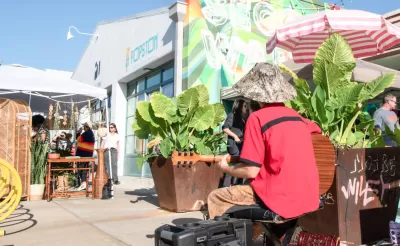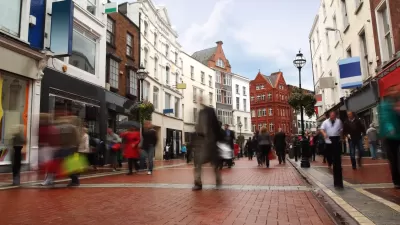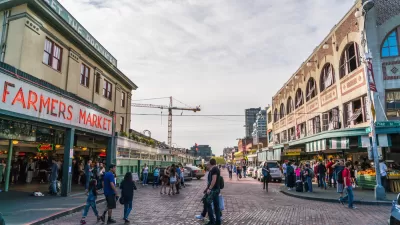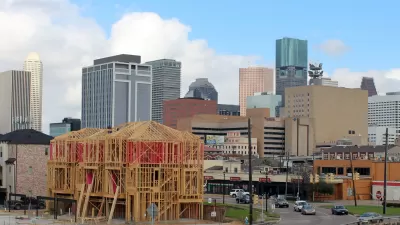The 17-acre Second Ward project has spurred both optimism for a more walkable city and concerns about displacement and gentrification.

A proposed Houston development could achieve some ambitious firsts for the historically sprawling city: “a pedestrian-friendly neighborhood of adaptive reuse buildings where low- and middle-income residents can live affordably, and where owning a car would be optional.”
As Marissa Luck explains in the Houston Chronicle, “Houston real estate firm Concept Neighborhood — a group of entrepreneurs that include some of founders of the Axelrad beer garden — previously unveiled plans to convert the former W-K-M warehouse complex in the East End into a mixed-use destination with hyperlocal businesses and walkable streets.” The 17-acre project will have up to 1,000 mixed-income housing units and 250,000 square feet of retail and office space, as well as a rails-to-trails conversion.
While the developers promise to “devise strategies for assisting small business tenants,” current tenants worry that rent increases will push them out of the area. Concept Neighborhood also plans to keep apartments affordable by opting out of high-end amenities and designing ‘micro units’ at around 400 square feet.
The project is still a long way from reality as Concept seeks financing and retail partners, as well as cooperation from adjacent property owners, whose own designs will influence the walkability of the area. “Walkability also will be influenced by what entities, such as the city of Houston and East End District, can accomplish in upgrading streets to make the pedestrian experience safer.”
FULL STORY: Exclusive: New 17-acre East End project aims to make cars obsolete with walkable, 'micro' living

Alabama: Trump Terminates Settlements for Black Communities Harmed By Raw Sewage
Trump deemed the landmark civil rights agreement “illegal DEI and environmental justice policy.”

Study: Maui’s Plan to Convert Vacation Rentals to Long-Term Housing Could Cause Nearly $1 Billion Economic Loss
The plan would reduce visitor accommodation by 25% resulting in 1,900 jobs lost.

Planetizen Federal Action Tracker
A weekly monitor of how Trump’s orders and actions are impacting planners and planning in America.

Baltimore Ordered to Improve Sidewalk Accessibility
The city is one of many to face lawsuits for failing to comply with the Americans with Disabilities Act.

This Toronto Suburb Has More Bus Riders Than Columbus, Ohio
Brampton, Ontario used gradual improvements in service to prove that if you build it, they will ride.

Paris Bike Boom Leads to Steep Drop in Air Pollution
The French city’s air quality has improved dramatically in the past 20 years, coinciding with a growth in cycling.
Urban Design for Planners 1: Software Tools
This six-course series explores essential urban design concepts using open source software and equips planners with the tools they need to participate fully in the urban design process.
Planning for Universal Design
Learn the tools for implementing Universal Design in planning regulations.
Smith Gee Studio
Alamo Area Metropolitan Planning Organization
City of Santa Clarita
Institute for Housing and Urban Development Studies (IHS)
City of Grandview
Harvard GSD Executive Education
Toledo-Lucas County Plan Commissions
Salt Lake City
NYU Wagner Graduate School of Public Service





























